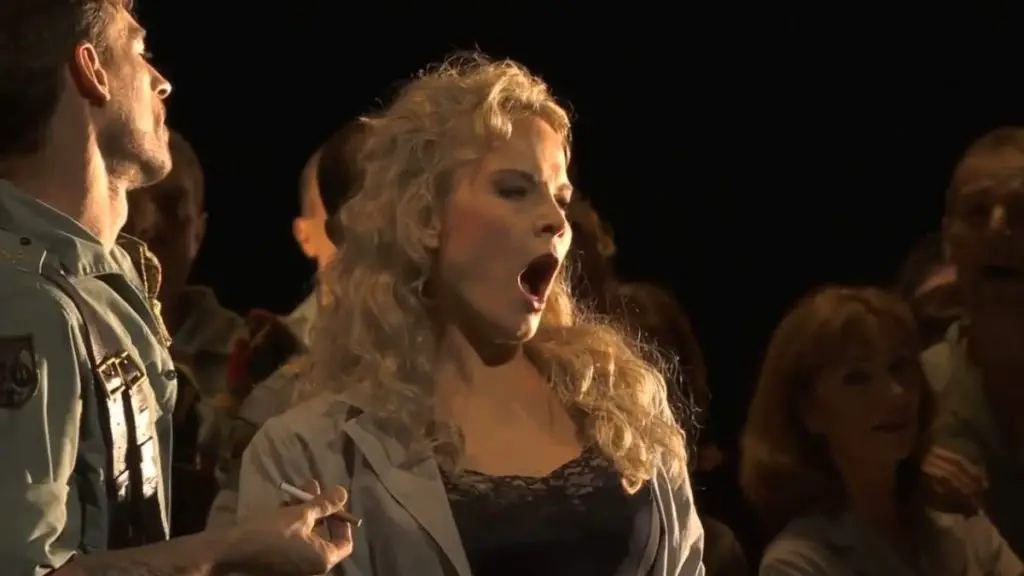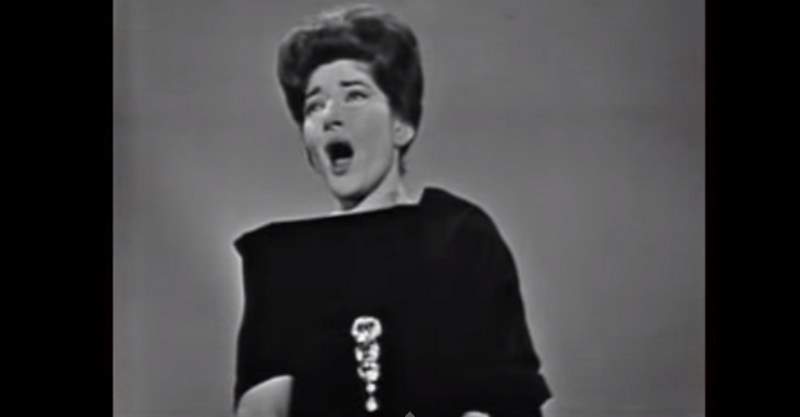Maria Callas, “La Diva” sings Habanera from Georges Bizet’s 1875 opera Carmen. Recorded at Covent Garden in 1962.
Habanera
Habanera, the popular name for “L’amour est un oiseau rebelle” (Love is a rebellious bird) is actually an aria for a mezzo-soprano role. It is one of the most famous arias from Bizet’s Carmen. It is the entrance aria of the title character, “Carmen”, a Gypsy Girl, in scene 5 of the first act.
Habanera is actually a Cuban popular dance music of the 19th century. The score of this aria was adapted from the habanera “El Arreglito”, originally composed by the Spanish musician Sebastián Yradier. Bizet thought it to be a folk song; when others told him he had used something that had been written by a composer who had died only ten years earlier, he had to add a note to the vocal score of Carmen, acknowledging its source.
By definition, the term “Diva”, which was coined around 1883, comes from an Italian derivation (from Latin) “divus”, meaning “goddess; a female deity, a highly distinguished female singer”. The word entered the English language in the late 19th century as “a celebrated female singer; a woman of outstanding talent in the world of opera”. Synonymous with “prima donna”, it has legendarily been used to describe highly-charged, larger-than-life female singers (typically in opera) who embody a presence that takes up the whole room, who stuns everyone with her talent and leaves trails of admirers in her wake.
Maria Callas was among the original true opera Divas, in the best sense of the word.
Habanera lyrics
The French libretto was written by Henri Meilhac and Ludovic Halévy.
French
Quand
Ma foi, je ne sais pas,
Peut-être jamais, peut-être demain.
Mais pas
(sung)
L’amour est un oiseau rebelle
Que nul ne peut apprivoiser,
Et c’est bien en vain qu’on l’appelle,
S’il lui convient de refuser.
Rien n’y fait, menace ou prière;
L’un parle bien, l’autre se tait,
Et c’est l’autre que je préfère;
Il n’a rien dit mais il me plaît.
(L’amour est un oiseau rebelle) L’amour…
(Que nul ne peut apprivoiser,) L’amour…
(Et c’est bien en vain qu’on l’appelle,) L’amour…
(S’il lui convient de refuser.) L’amour…
L’amour est enfant de Bohême,
Il n’a jamais, jamais connu de loi;
Si tu ne m’aimes pas, je t’aime;
Si je t’aime, prends garde à toi! (Prends garde à toi!)
Si tu ne m’aimes pas,
Si tu ne m’aimes pas, je t’aime; (Prends garde à toi!)
Mais si je t’aime, si je t’aime;
Prends garde à toi!
(L’amour est
(Il n’a jamais, jamais connu de loi;)
(Si tu ne m’aimes pas, je t’aime;)
(Si je t’aime, prends garde à toi!) (Prends garde à toi!)
Si tu ne m’aimes pas,
Si tu ne m’aimes pas, je t’aime; (Prends garde à toi!)
Mais si je t’aime, si je t’aime;
Prends garde à toi! (Prends garde à toi!)
L’oiseau
Battit de
L’amour est loin, tu peux l’attendre;
Tu ne l’attends plus, il est là.
Tout autour de toi, vite, vite,
Il vient, s’en va, puis il revient.
Tu crois le tenir, il t’évite,
Tu crois l’éviter, il te tient!
(Tout autour de toi, vite, vite) L’amour…
(Il vient, s’en va, puis il revient.) L’amour…
(Tu crois le tenir, il t’évite,) L’amour…
(Tu crois l’éviter, il te tient!) L’amour…
L’amour est enfant de Bohême,
Il n’a jamais, jamais connu de loi;
Si tu ne m’aimes pas, je t’aime;
Si je t’aime, prends garde à toi! (Prends garde à toi!)
Si tu ne m’aimes pas,
Si tu ne m’aimes pas, je t’aime (Prends garde à toi!)
Mais si je t’aime, si je t’aime
Prends garde à toi!
(L’amour est
(Il n’a jamais, jamais connu de loi;)
(Si tu ne m’aimes pas, je t’aime;)
(Si je t’aime, prends garde à toi!) (Prends garde à toi!)
Si tu ne m’aimes pas,
Si tu ne m’aimes pas, je t’aime (Prends garde à toi!)
Mais si je t’aime, si je t’aime
Prends garde à toi! (Prends garde à toi!)
English translation
When will I love you?
Good Lord, I don’t know,
Maybe never, maybe tomorrow.
But not today, that’s for sure.
Love is a rebellious bird
That none can tame,
And it is well in vain that one calls it
If it suits him to refuse
Nothing to be done, threat or prayer.
The one talks well, the other is silent;
And it’s the other that I prefer
He says nothing but he pleases me.
(Love is a rebellious bird) Love…
(that none can tame,) Love…
(and you can call him, although it is, quite in vain,) Love…
(because it suits him not to come) Love…
Love is a gypsy’s child,
It has never, never known the law;
If you do not love me, I love you;
If I love you, take guard yourself (Take guard yourself!)
If you do not love me,
If you do not love me, I love you (Take guard yourself!)
But if I love you, if I love you
Take guard yourself!
(Love is a gypsy’s child,)
(It has never, never known the law;)
(If you do not love me, I love you;)
(If I love you, take guard yourself) (Take guard yourself!)
If you do not love me,
If you do not love me, I love you (Take guard yourself!)
But if I love you, if I love you
Take guard yourself! (Take guard yourself!)
The bird you hoped to catch
Beat its wings and flew away …
Love is far, you can wait for it
You no longer await it, there it is
All around you, swift, swift,
It comes, goes, then it returns …
You think to hold it fast, it flees you
You think to flee it, but it holds you
(All around you, swift,) Love…
(It comes, goes, then it returns) Love…
(You think to hold it fast, it flees you) Love…
(You think to flee it, it holds you) Love…
Love is a gypsy’s child,
it has never, never known the law;
if you love me not, then I love you;
if I love you, take guard yourself (Take guard yourself!)
if you love me not,
if you love me not, then I love you (Take guard yourself!)
but if I love you, if I love you
take guard of yourself!
(Love is a gypsy’s child,)
(it has never known the law;)
(if you love me not, then I love you;)
(if I love you, take guard yourself) (Take guard yourself!)
if you love me not,
if you love me not, then I love you (Take guard yourself!)
but if I love you, if I love you
take guard yourself (Take guard yourself)
Sources
- Habanera (aria) on Wikipedia
- “What makes a diva?” on the Voicegal’s blog
- ‘Habanera’ lyrics: how does the famous aria from Bizet’s Carmen go? on the BBC Classical Music website
- “Habanera by Georges Bizet” on the Song Facts website


